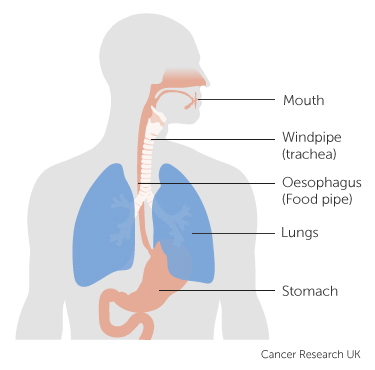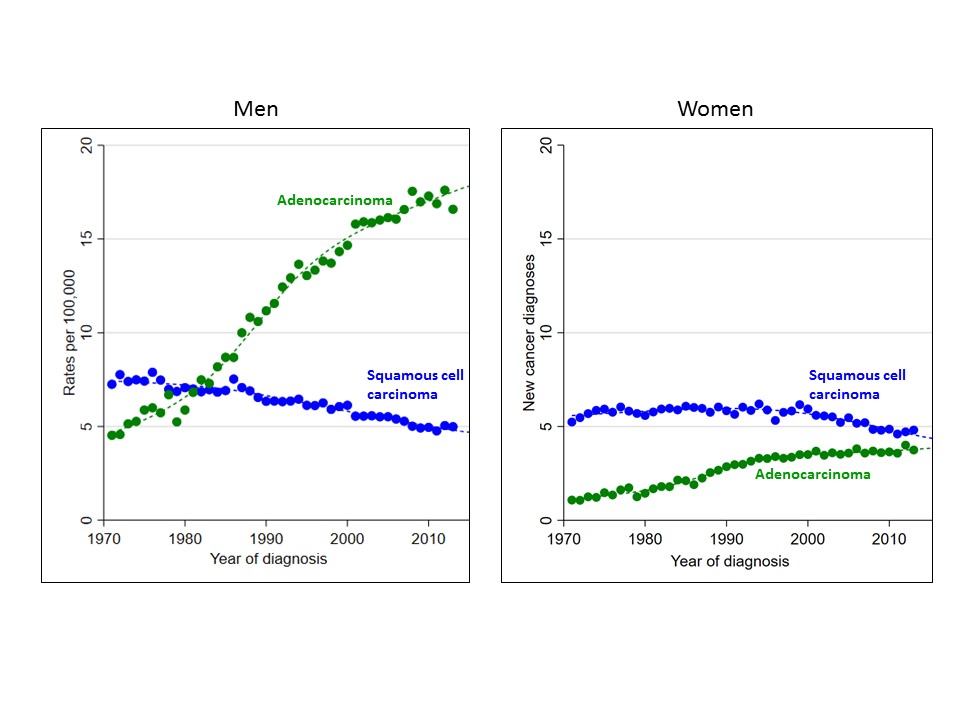
Nearly 9,000 people are diagnosed with oesophageal cancer (food pipe) each year in the UK and estimates suggest that this type of cancer has become more and more common over the last 40 years.
There are two main types of cancer that can be found in the oesophagus – squamous cell carcinoma (which affects the top of the food pipe) and adenocarcinoma (which affects the bottom of the food pipe, near the stomach). These two types are distinguished by the types of cells that are involved in the cancer, but they also have quite different risk factors. Smoking increases the risk of both types. Alcohol also increases the chances of developing squamous cell carcinoma. While adenocarcinoma is linked to obesity and acid reflux (heartburn).
In a recent study, we analysed data from 220,000 cases of cancer in the oesophagus between 1970 and 2013 in order to gain an understanding of trends for the two different types of cancer that can be found in the oesophagus – squamous cell carcinoma and adenocarcinoma.
An understanding of the trends is vital to allow a better understanding of the changing risk factors as well as a more accurate approach to the planning of health services and resources. The findings showed an overall five-fold increase in oesophageal adenocarcinoma between 1972 and 2012 and a decrease in the number of squamous cell carcinoma over the same period. We furthermore predict that the annual number of newly diagnosed adenocarcinomas will become stable and the number of squamous cell carcinomas of the oesophagus will decrease over the next 20 years.


The dramatic increase in adenocarcinoma rates will most likely have been caused by a combination of the main risk factors; chronic heartburn or reflux, Barrett’s oesophagus (a complication of reflux) and obesity. The steady increase in obesity levels in England has previously been linked to high incidence of oesophageal adenocarcinoma’s. The main risk factors for squamous cell carcinomas on the other hand are smoking and alcohol. The proportion of both men and women who smoke in England has nearly halved between 1980 and 2010. This reduction could be largely responsible for the decrease in squamous cell carcinomas we observed. We also hypothesise that the introduction of new medication to treat heartburn (such as Nexium, Prevacid, Prilosec and Zantac) in the 1990s is at least partially responsible for the reduction in new diagnoses of adenocarcinomas observed since the noughties.
We pieced together patient data in order to build a complete picture of the type of cancer (squamous cell carcinoma or adenocarcinoma) even where this was not recorded. We also used advanced statistical models to better understand the impact of risk factors that were specific to patients born in different years.
By better understanding behaviours or drug treatments that increase or decrease cancer risk, we can advise patients at high risk about how they might change their behaviour or advise them on treatments to reduce their risk of developing cancer. This information can also provide an evidence-base by which health services can more effectively plan the use of their resources and, ultimately, improve the care of patients.
We are planning further studies where we will examine this in more detail to try and better understand the factors that increase and decrease the risk of each type of oesophageal cancer. We are also studying how to detect pre-cancerous changes to the cells in the oesophagus so that health professionals may be able to intervene either prevent cancer or diagnose cancers early for the maximum chance of successful treatment.
The views expressed are those of the author. Posting of the blog does not signify that the Cancer Prevention Group endorse those views or opinions.

Leave a Reply